De Duitse dichter, singer-songwriter en muzikant Hans-Eckardt Wenzel werd geboren op 31 juli 1955 in Kropstädt bij Wittenberg. Zie ook alle tags voor Hans-Eckardt Wenzel op dit blog enook mijn blog van 31 juli 2010.
August
Das war ein Sommer, wie ich lange ihn nicht kannte.
Das Land lag faul und ward am Spieß gedreht,
Da war die Sonne, die auf unsre Rücken brannte
Und auf den Feldern wurde schon das Korn gemäht.
Wie Katzen, die sich in der Sonne sielen,
So lagen wir, fast fiebertrunken, hinterm Haus
Und als die ersten Tropfen Regen niederfielen
Da wars, als zögen wir uns, nackt, noch einmal aus.
Und als der Regen blieb bis übern Nachmittag
Und schlug mit seinen Fingerkuppen auf das Dach
Da wars, als ich in deinen Armen lag,
Als würden wir zum ersten Male wach.
Dezember
Sich umzudrehn, ein letzter Aufenthalt.
Der Weg, das Dorf, Minuten, die Epochen.
Nun wird es spät und klar und kalt.
Die Linden klappern laut mit ihren Knochen.
Der Wind dreht weg und wieder fällt kein Schnee,
Und schon beginnt die Ferne neu zu flimmern.
Ein harter Strich durchs Land ist die Allee.
Die Menschen sitzen in den guten Zimmern.
Zwölf Monde sind verbraucht, das Jahr ist leer,
Von Sommern fern, so fern von Paradiesen.
Der Abend kommt, das Land steigt in das Meer,
Und Sterne stürzen in die Wiesen.
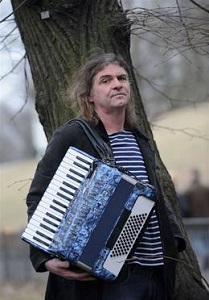
Hans-Eckardt Wenzel (Kropstädt, 31 juli 1955)
Volgens de Franse Wikipedia is de Algerijnse, Franstalige schrijver Ahmed Zitouni geboren op 31 juli 1949 in Saïda, Algerije. Zie ook alle tags voor Ahmed Zitouni op dit blog en ook mijn blog van 31 juli 2010.
Uit: Amours sévices & Morgue
„Pourquoi, en guise de bonne année, occire son beau-père, puis sa belle-soeur ?
Et pourquoi épargner sa femme et sa belle-mère ?
Et pourquoi avoir zigouillé cet oesophage en déliquescence, ainsi qu’une innocente au corsage fleuri à ras bord ?
Longtemps, je me suis torturé la cervelle. J’ai soupesé nombre d’hypothèses et incarné mille et mille rôles droit sortis des plus échevelés registres d’horreur. J’improvisais en pensée, en folie douce, en abjection domestiquée. J’improvisais. Revenais. M’attardais. Jouissance et dégoût. Aucune honte. J’improvisais. Entrais en interdit. Me mettais à sa place, pour de faux, pour en rire. Tenter de le comprendre… sans vraiment y croire. Espérer… et encore, faute de mieux. M’aventurer dans un inconnu si particulier, dans ces friches humaines où il avait fini, me terrifiait. Monstruosité singulière. Un diamant noir d’humanité sans limites. Des années, des angoisses plus tard, j’habite encore un vivre fait de suaves répulsions, d’inavouables plaisirs. Mes sommeils sont souvent déchirés de cris et de mains fouettant le vide. Les blessures sont amour. Le sourire de Malik continue de clignoter derrière des voiles de néant. Je grelotte de temps à autre, ouvre les yeux ou feins de me rendormir. À quoi bon le traquer encore. Me penser dépositaire de je ne sais quelle occulte procuration. Ridicule ! Même pas l’illusion d’un tardif témoignage. Et pourtant la certitude de l’existence de liens étranges, d’une mission extraordinaire, des ondes et des appels entre une fosse commune et ma table de travail, l’encre noire de ma plume et ses ongles évaporés en boussoles errantes. Un contrat d’horreur et d’exaspération. Pendu à son bon vouloir.
Il me hante et je le renie.
Je le hais et il me réveille.”
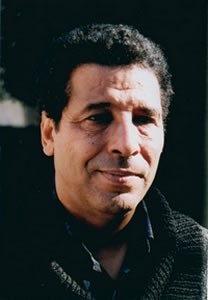
Ahmed Zitouni (Saïda, 31 juli 1949)
De Indische (Hindi en Urdu) schrijver Munshi Premchand werd geboren in Lamhi op 31 juli 1880. Zie ook alle tags voor ook Munshi Premchand op dit blog en ook mijn blog van 31 juli 2010.
Uit: The Gift of a Cow (Godan, vertaald door Gordon C. Roadarmel)
“Horiram served fodder to his two cows and addressed his wife, Dhania – Send Gobar to plough the sugarcane fields. I may return late. Hand me my lathi quickly.
Dhania had both her hands soiled with cow-dung. She had just returned after making cakes out of cow-dung. She said – What is the hurry? Have some drink or light food.
Hori frowned and all the wrinkles of his forehead creased together when he retorted – Here you are bothered about eating and I am worried that if there is a delay, I will not be able to meet the Master. If he starts his schedule of bathing and daily oblations and prayers, I will have to wait for hours together.
That is why I want you to take some food before you go.
Besides, what loss will you incur if you don’t go today? It’s just the day before yesterday that you had been there.
Why do you always meddle in affairs which you don’t understand? Give me my lathi and see to your chores. It is the fruit of these good relations that we are living in peace. Otherwise no one would have known where we have disappeared. There are so many people in the village who have faced Eviction Orders and Attachment. When our necks are shoved and throttled under someone else’s feet, it is rather better to tickle his heel.
Dhania was not all that diplomatic. She was of the opinion that since they had also tilled the fields of the zamindar, he could at the most claim taxes. Then why should they flatter him or be a toady to him? In these twenty years of her married life, she had realised one thing for sure, she may scrimp or scourge every penny, live a niggardly life without proper food or clothes, collect every elusive penny, it was impossible to square up the taxes of the zamindar. Yet she never conceded defeat and there was a debate between the husband and the wife every second day on this issue. Out of her six children only three survived. The eldest was the son, Gobar, who was eighteen years of age followed by Sona, who was twelve and the youngest was Rupa, who was eight years old. Her other three sons had died in their early childhood. Even today, she felt that had they received proper medical care, they would have survived but she had not been able to nurse them with medicines.”
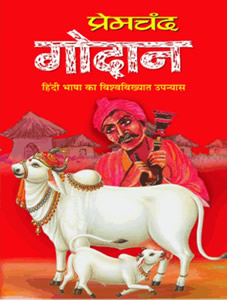
Munshi Premchand (31 juli 1880 –8 oktober 1936)
Cover van een uitgave in Hindi
De Oostenrijkse dichter en schrijver Peter Rosegger werd geboren op 31 juli 1843 in Alpl, Steiermark. Zie ook alle tags voor Peter Rosegger op dit blog en ook mijn blog van 31 juli 2010.
Ein bißchen mehr…
Ein bißchen mehr Friede
und weniger Streit,
ein bißchen mehr Güte
und weniger Neid,
ein bißchen mehr Liebe
und weniger Haß,
ein bißchen mehr Wahrheit,
das wär doch schon was.
Statt soviel Hast
ein bißchen mehr Ruh’.
Statt immer nur ich
ein bißchen mehr Du!
Statt Angst und Hemmungen
ein bißchen mehr Mut
und Kraft zum Handeln,
das wäre gut.
Kein Trübsinn und Dunkel,
mehr Freude und Licht.
Kein quälend Verlangen,
ein froher Verzicht
und viel mehr Blumen
so lange es geht,
nicht erst auf Gräbern,
da blühn sie zu spät!
Unser Herz ist eine Harfe
Unser Herz ist eine Harfe,
Eine Harfe mit zwei Saiten;
In der einen jauchzt die Freude
Und der Schmerz weint in der zweiten.
Und des Schicksals Finger spielen
Kundig drauf die ewigen Klänge,
Heute frohe Hochzeitslieder,
Morgen dumpfe Grabgesänge.
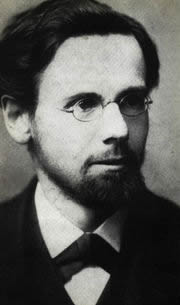
Peter Rosegger (31 juli 1843 – 26 juni 1918)
De Iraanse dichter en schrijver Ahmad Akbarpour werd geboren op 31 juli 1970 in Lamerd, Shiraz. Zie ook alle tags voor Ahmad Akbarpour op dit blog ern ook mijn blog van 31 juli 2010.
Uit: That Night’s Train (Vertaald door Majid Saghafi)
“The train went clickety-click, clickety-clack and came out of the darkness.
The young woman opened her book again. Just before she turned the page, she turned to the little girl and smiled.
“If my mother were alive, she would be reading me a story now,” Banafsheh said.”
(…)
“The children listening to this story were in the fifth grade. The last bits of winter snow were falling. The children’s eyes were glued to the lips of the teacher, who was warming her hands over the classroom heater.
‘Excuse me, miss, but what happened next?’ one student asked.”
(…)
“What is important to her is that she finds a clue in some conversation or between the lines of all these various tales that could explain why she is feeling so strange. Even more important, she must be able to carry on with her story.”
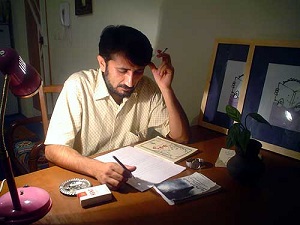
Ahmad Akbarpour (Lamerd, 31 juli 1970)
De Noorse dichter Triztán Vindtorn werd geboren als Kjell Erik Vindtorn in Drammen op 31 juli 1942. Zie ook alle tags voor Triztán Vindtorn op dit blog en ook mijn blog van 31 juli 2010.
The world’s a beautiful blue lemon
The world’s a beautiful blue lemon
as weightless as all words are
when seeking to describe it…
what’s liberated also bears with it the longings
and anxiety about the goal not being reached
up till now you can count your beloved’s fingers
and tiptoe out of sleep as from a forest
up till now you can hear the front door creak…
fire will shortly thunder through
all your rooms and annihilate your house…
all language parasites will explode
and shatter our fabricated image of happiness
you half-smothered in colours’ relentless night
you among the foam-head of words and sentences
you alone on the shore with an overturned sea
as the only visible neighbour.
Vertaald door John Irons
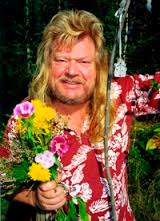
Triztán Vindtorn (31 juli 1942 – 4 maart 2009)
